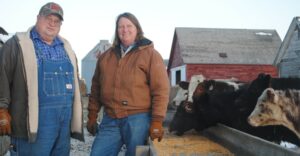As a farmer, I not only think about purchasing and preparing food but producing it as well. I’m Ruth Ready, and my husband, Sid, farm near Scribner, Nebraska. In addition to farming, Sid is also a high school science teacher. We have four children and four grandchildren. On our farm, we grow corn, soybeans, alfalfa, raise beef cattle, chickens and turkeys. I volunteer with CommonGround Nebraska to share my food story from production to plate with anyone interested.

CommonGround Nebraska is a group of farm women who have conversations with consumers about food. By sharing our lives as farmers, we hope others can feel as confident in their food decisions as we do. By showing how food is produced on our farms through the use of science and research, CommonGround volunteers want to help you make your food decisions based on facts – not on fear.
Let’s get the conversation going with some basic questions and answers about farming and food production.
Q: Can you save the planet by not eating meat?
A: Reducing or eliminating the consumption of meat would have a minimal effect on overall greenhouse emissions. Research by Dr. Frank Mitloehner, a professor and air quality specialist in Cooperative Extension at the University of California, Davis, shows that we would have more impact if we focused on other aspects of consumer consumption. Electricity, transportation and industry each generate over twice the amount of greenhouse gases when compared with all of agriculture.
Q: Are all farms owned by giant corporations?
A: NO! 98% of all farms in the U.S. are family farms. Don’t be confused by the word corporation in a farm ownership title. The truth is that many family farms have incorporated as a business but are still operated by families living and working on the land. Most of today’s farmers are college educated and rely on the latest science and technology in order to sustain their land and resources for generations to come.
Q: Are foods made with GMO ingredients safe?
A: GMOs (genetically modified organisms) have been around for 25 years without a single substantiated case of harm to human health. Every new GMO is thoroughly tested before it is released to the public. There are only 10 GMO crops on the market in the U.S.: corn, soybeans, alfalfa, canola, cotton, sugar beets, papaya, summer squash, Arctic® apples, and the Innate potato. Most GMOs, or biotech crops, are grown to address a problem that greatly affects the success of the crop such as pests, weeds, disease or spoilage. The result is great food safety while increasing production, reducing inputs and eliminating food waste.
Q: I have seen foods advertised as being sustainably or regeneratively produced. What does that mean?
A: Sustainable and regenerative production are the newest marketing words to influence your food purchases. As a farmer, we have been growing food with sustainable and regenerative methods all along. What those words really mean is that we strive to supply a growing world with food, fuel, feed and fiber while safeguarding its resources for future generations. Nebraska farmers depend upon clean water, soil and air. Every year, we are growing more food with fewer inputs: less water, less chemicals, and less land. Our goal continues to be producing safe, abundant and affordable food.



